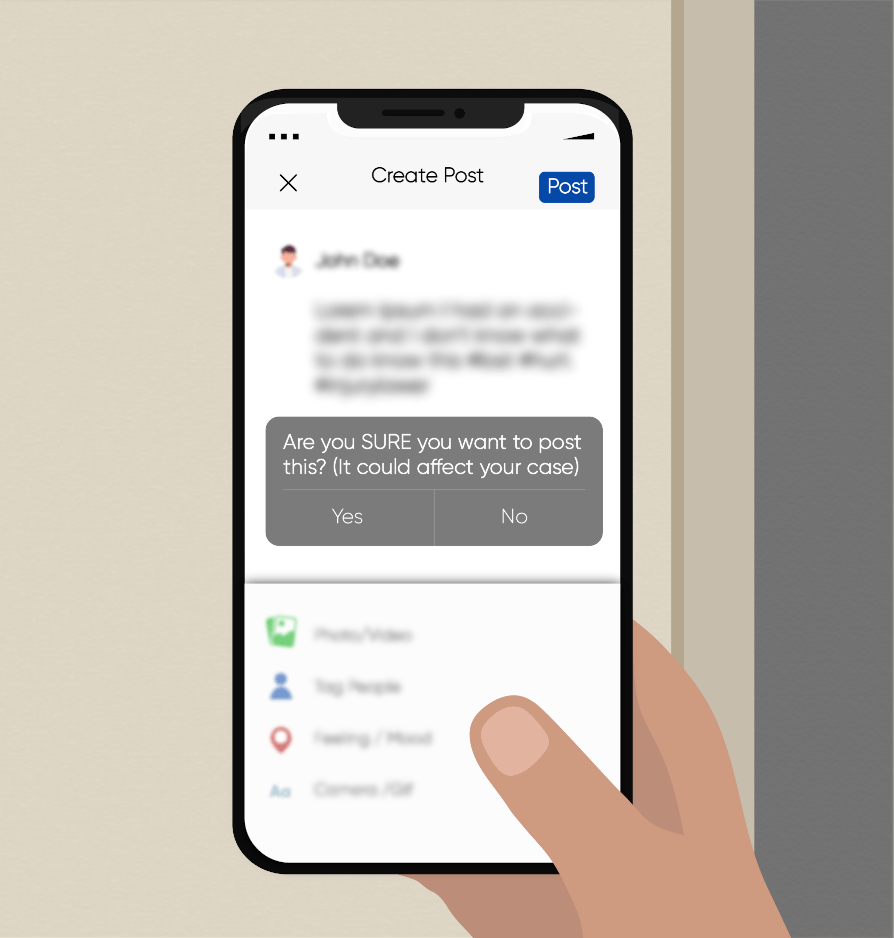
Social media can be a wonderful example of how we can use technology to share photos of our families and stay in touch with loved ones near and far. However, social media has a darker side when it comes to injuries and claims. Social media could potentially be harmful to the outcome of your claim if you are not careful.
Don’t post, don’t boast
Because of the prevalent use and access to personal information on social media channels, many personal injury lawyers will tell clients from the onset of their claim to be very mindful of what they post on social media, including posting pictures and statuses, and even checking in to different locations.
Why can’t we post?
Cases where a defendant had very little chance of success have actually been won or settled for a fraction of the original claim as a result of “smoking gun” evidence obtained from a search of the Plaintiff’s social media by the Defence, as noted in Ethical and Legal Issues in E-Discovery of Facebook Evidence in Civil Litigation.
This is the number one reason your personal injury lawyer will ask you to refrain from posting on social media. While you may have a “good day” and feel like you can do a little bit more than usual, that photo could be taken out of context by the Defence leading to a much smaller settlement than would have been received had the photo not been posted.
The Defence will search your social media platforms for this type of activity and will use it to prove that your injuries are not as severe or life altering as you claim.
You don’t have to avoid social media
It’s important to note, that you can still be active on social media, but be mindful of what you are sharing with the world.
Think of it like this, if you make a claim that you cannot walk for long periods of time as a result of your accident, and then posts a picture on Instagram of you hiking on a trail or going for a run, it raises doubt regarding the credibility of both you and your claim.
Privacy settings won’t help
There have even been cases where the Defence has gone so far as to apply to the court to obtain access to the Plaintiff’s social media accounts, and in some cases the court has approved the application.
In Isacov v Schwartzberg, 2018 ONSC 5933, the Plaintiff was a pedestrian who was injured when a vehicle ran over her right foot. The Plaintiff sued the driver and the owner of the vehicle for damages. During the litigation process, the Plaintiff claimed that she could not run and would never be able to wear shoes with heels. In addition, the Plaintiff claimed that she was a professional ballroom dancer and now had to give it up as she was not permitted to wear high-heeled shoes.
The Defence hired a private investigator who obtained pictures from the Plaintiff’s friend’s Instagram page that showed the Plaintiff on the dance floor with high-heeled shoes.
And while there was no proof that the Plaintiff was dancing, as a result, the Plaintiff was required to produce copies of all her social media pages to the Defendant, including Facebook and Instagram for the previous three years.
In the courts
And that is not the only case where social media has been brought into the courtroom.
In Kourtesis v. Joris, the Plaintiff was involved in a serious motor vehicle collision and sued for damages. At trial, the main issue was whether the Plaintiff suffered sufficient injuries to justify an award for pain and suffering and loss of enjoyment of life. The Plaintiff’s claim was for injuries to her neck and shoulders, as well as memory loss and problems with concentration.
The Defence obtained an order from the court to grant them access to additional pictures of the Plaintiff’s Facebook account. The pictures obtained showed the Plaintiff clearly socializing with friends three months prior to the start of the trial.
The court found that the pictures obtained contradicted the Plaintiff’s claim of the loss of enjoyment of life and that she suffered from memory loss and problems concentrating. As a result, the Plaintiff’s claim for damages was dismissed.
However, there are instances where the courts will refuse access to social media accounts.
In the case of Cui v. Metcalfe, 2015 BCSC 1195, the court defined grounds for when social media accounts can be taken into consideration, namely the probative value of the information sought, privacy concerns, potential prejudice to the plaintiff and proportionality. In this case, the Defence’s request was denied.
We see these grounds applied again in the case of Wilder v. Munro, 2015 BCSC 1983.
Here, the Plaintiff was injured in a motor vehicle collision in 2010, where they sued for damages. During the litigation process, the Defence reviewed the Plaintiff’s social media accounts and obtained evidence that questioned the Plaintiff’s position. The Defence found ten separate videos of the Plaintiff dancing in rehearsal or shows in 2013, 2014, and 2015. There were also photographs of the Plaintiff performing dance moves, Facebook posts discussing upcoming dance shows and auditions, photographs and posts of the Plaintiff’s attendance at music festivals in 2014, and travel related to a home-based business, as well as photos of the Plaintiff socializing with friends.
However, the Defence’s request for access to the Plaintiff’s social media accounts was rejected due to the Defendant’s failure to demonstrate the probative value of any photographs or videos depicting the Plaintiff socializing or on vacation.
It’s better to be safe than sorry
Although courts do not always allow the Defence to obtain access to social media accounts, the potential is still present. The important takeaway is to be mindful of what you post on your social media accounts and always make sure that you report the true nature of your injuries to your personal injury lawyer to ensure that your case is built on factual claims that cannot be disproved by social media.
Request a
Free Consultation
If you would like to learn your legal options at no obligation, contact us today to set up a free consultation.
